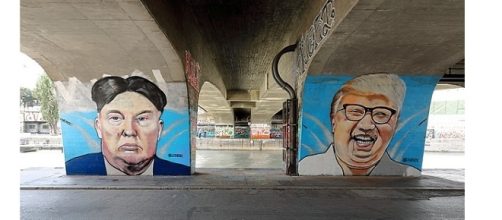Sanctions by western nations and North Korea's neighbors continue to crumble its economy. The sanctions are aimed at putting pressure on its government to stop the development of nuclear weapons. The country had a nominal GDP per capita of $1,300 in 2016 according to Bloomberg. Japan's nominal GDP was $38,895 in 2016; South Korea recorded a nominal GDP of $27,539 while china had a nominal GDP of $8,123 in 2016. Low nominal GDP means that North Korean people are not producing as much compared to their neighbors.
Sanctions against Kim Jong-un's government
Sanctions against North Korea were imposed in 2006 after the country conducted its first nuclear test. The UN imposed a ban on exports of military supplies and luxury goods to that county in 2006 while an arms embargo was imposed in 2009 after the country conducted its second nuclear test. Recent sanctions have targeted its mining industry such as the banning of exports of copper, nickel, zinc, and silver in November 2016 and the prohibition of exports of coal and iron in August 2017 by North Korea. The UN also passed a resolution to limit its crude oil and refined petroleum import product on September 11, 2017. As of May 2013, several large Chinese banks stopped all cross-border cash transfers with North Korea.
On September 21, Trump issued an executive order that seeks to cut from its financial system and freeze assets of companies, businesses, organizations and individuals trading in goods, services and technology with North Korea. Other sanctions have also been passed by countries such as South Korea, Japan, and the European Union.
It's crumbling economy
The growth of its economy has been slow since 2009. The country experienced negative growth in 2009, 2010 and 2015. Between 2009 and 2015, the highest yearly growth its economy has ever achieved is 1.3 percent.
Its inflation is also high and an impediment to its development. Data currently available on its inflation rate shows that inflation in that country was at 55 percent in July 2013.
In March 2011, the inflation rate was 140 percent. Before 2011, yearly inflation was above 1,000 percent when the Won was pegged to the dollar.
The country is also ranked as the most corrupt country in the world. In 2016, it was ranked 174 least corrupt nation out of 175 corrupt nations in the world. It is among the list of most corrupt countries in the world such as Somalia, South Sudan, Syria, Yemen, and Sudan.
Other risks that are present in its economy is that China continues to be its primary trading partner. In 2015, 75.8 percent of its exports were sold to China while 76.4 percent of its imports were from China according to CIA World Factbook. Strict import and export sanctions by China to North Korea would worsen its worsening economic situation.


